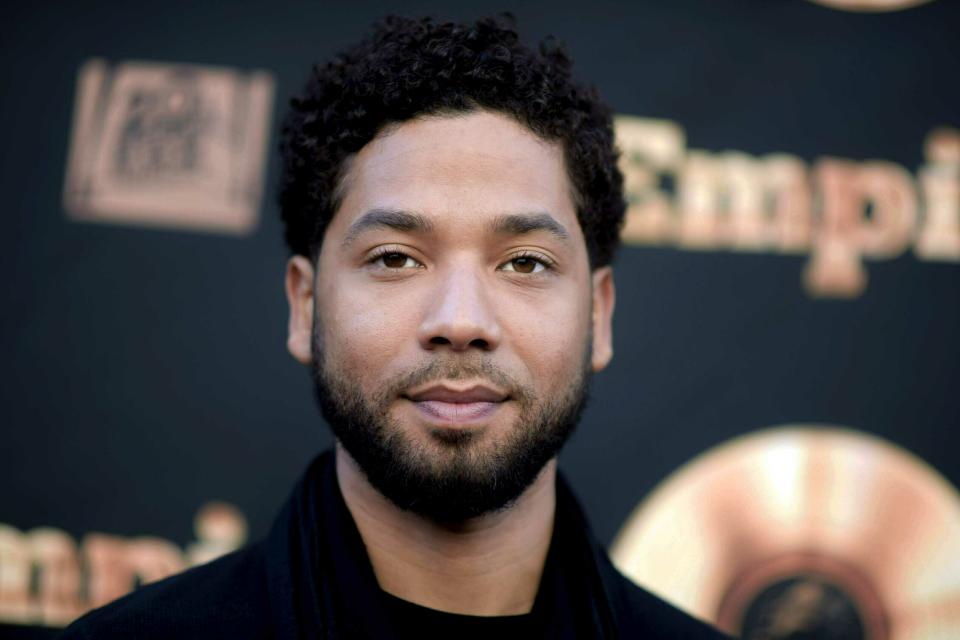Jussie Smollett's alleged plan to manufacture outrage diminishes impact of real hate crime
Days before the incident that made him infamous, accused hate-crime hoaxer Jussie Smollett tweeted out, “Frauds are everywhere y’all.” In retrospect, this seems like either an ironic warning or a subconscious cry for help.
Why did Smollett believe that his alleged plan to manufacture outrage would succeed? Most probably because is was designed to fit a specific, well-established victimhood narrative. In this case, it was the young, gay, black celebrity versus the beastly, MAGA-preaching white racist homophobes. There is no ambiguity in that almost cartoonish scenario.
The props (the rope and the bleach) and Trump-implicating rhetoric were necessary to establish the supposed hate motive. Otherwise Smollett might have been viewed as just another Chicago crime victim. And it was important to tie the faux attack to the idea prevalent on the left that the advent of the Trump era has unleashed an unprecedent wave of violence against “the other.” Rep. Alexandria Ocasio-Cortez, D-N.Y., helped push this idea when she tweeted out after the initial reports of the alleged assault that “it is no one’s job to water down or sugar-coat the rise of hate crimes.”

Read more commentary:
Fake news is a test for citizens. Here's how to pass it.
Covington Catholic furor is a warning to end our dangerous social media mob mentality
Kirsten Powers: I'm not proud of role I’ve played in toxic public debate. I plan to change.
That is true, but it is no one’s job to exaggerate (or fake) hate crimes either. According to FBI statistics, there were 7,175 hate crimes in 2017, of which 28 percent were anti-black and 9 percent aimed at gay men.
That is up from the 6,121 reported hate crimes in 2016, but part of a growing trend that began in 2014, so it is hard to pin the blame on President Donald Trump.
Also, while even one hate crime is too many, they are not rampant compared with crime in general. In 2017 there were 788 aggravated assaults motivated by one form of bias or another out of an estimated 810,825 total aggravated assaults that year. And note that the overall number of assaults had also increased since 2016, which fits the general trend.
Smollett 'could have created a race war'
Smollett played the victim card to the hilt after the alleged hoax attack, telling fans at a performance in West Hollywood how he “fought the f--- back” against his attackers and bragging that he was “the gay Tupac,” an exorbitant claim that rapper 50 Cent satirized in a scathing meme.
Smollett’s family called the incident an act of domestic terrorism. And on cue various figures in the press, punditry and politics launched into the usual overheated analyses of what the attack symbolized in Trump’s America. Democratic presidential aspirants Kamala Harris and Corey Booker both amplified the victim narrative with ominous references to lynching, then sheepishly retreated when the affair turned out to be a case of fake noose.
One of the most preposterous quick takes appeared in GQ, which heatedly concluded that “America's choice to embrace the blind rage of late-stage whiteness in decline is an explicit longing for this kind of crime.”
This article was tweeted out by Rep. Rashida Tlaib, D-Mich., who ironically warned that the “dangerous lies spewing from the right wing is (sic) killing & hurting our people.”
The dangerous lie was the one attributed to Smollett, whom black civil rights activist Najee Ali of Project Islamic HOPE said, “could have created a race war.”
Smollett expected the outrage he garnered
Of course, Smollett would have expected righteous outrage to erupt in response to his alleged hoax crime. It would have been part of the marketing effort. CNN’s Don Lemon, while acknowledging that it was “not cool” for Smollett to lie, seemed to imply that the real issue was a failure on the accused felon’s part to have an effective crisis public relations plan, referencing Smollett’s softball interview on Good Morning America.
No, the real issue is how easily and quickly people latch on to hoaxes like the one attributed to Smollett, aiding and abetting the farce absent any solid evidence to support it.
This is not the only recent case of hoaxes or misreported victimization narratives. The potentially libelous coverage of the Covington Catholic High School kids at the Lincoln Memorial is one example. There was also a false allegation levied against then-Supreme Court nominee Brett Kavanaugh, which many initially believed. Whether the hoaxes involve racial slurs, homophobic death threats, hijab grabbing, racially motivated vandalism, racist graffiti, church burning, or spray-painted swastikas, in every such case the perpetrator relies on the willingness or even eagerness of others to believe that this type of behavior credibly reflects a chronically sick and divided country.
This diminishes the experiences of the actual victims of bias crime in America, and gives a platform to those who want to sow division and discord. If Jussie Smollett is guilty of planning this elaborate hoax, then the hate crime was his alone.
James S. Robbins, a member of USA TODAY's Board of Contributors and author of "Erasing America: Losing Our Future by Destroying Our Past," has taught at the National Defense University and the Marine Corps University and served as a special assistant in the office of the secretary of Defense in the George W. Bush administration. Follow him on Twitter: @James_Robbins
You can read diverse opinions from our Board of Contributors and other writers on the Opinion front page, on Twitter @usatodayopinion and in our daily Opinion newsletter. To respond to a column, submit a comment to letters@usatoday.com.
This article originally appeared on USA TODAY: Jussie Smollett's alleged plan to manufacture outrage diminishes impact of real hate crime

